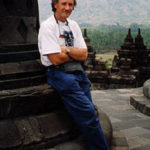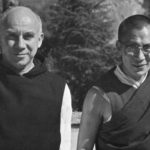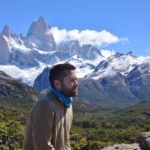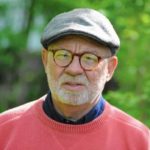As National Geographic’s “Digital Nomad“, Andrew Evans has sent live updates from kayak, camel-back, airplane, helicopter, cargo ship and sailboat — atop arctic glaciers and from deep within the tropical jungle, while staring in the face of wild animals or from the summits of rare mountains. He is the author of four books, including bestselling guidebooks to Ukraine and Iceland
. He has contributed to several other books, including 100 Great Cities of the World
, and received two Lowell Thomas Awards, two Folio Awards and an award from the National Travel Journalism Association. He is the host for National Geographic Channel’s upcoming one-hour documentary, “The World in Two Cities,” and he has appeared on the Travel Channel, FOX News, BBC Radio, and National Geographic Weekend. In 2011, he delivered a TED Talk entitled “Traveling with Uncertainty.”
How did you get started traveling?
I was born that way — obsessed with the outside world and impatient to explore everywhere. I read the atlas, National Geographic, and Triple-A travel brochures. Long before I actually went anywhere, I had gone everywhere mentally. Also, my whole family is made up of compulsive travelers. My grandparents lived and traveled all over the world and my parents drove us about everywhere you could drive in North America.
I was 16 when I made my first solo commercial airline flight on that nostalgic flagship, PanAm — JFK to Paris. I had a round-trip ticket, but the airline went out of business halfway through my journey. Instead of panicking, I discovered how much I loved the adventure of uncertainty that comes with travel. I’ve been an addict every since.
How did you get started writing?
I wrote my first essay in crayon on the wall of my parents’ kitchen. At age six, I graduated to colored felt tip markers and began keeping a journal. I also used to love writing on maps — I would invent journeys and write them up right inside the atlas, scribbling whole paragraphs in the Atlantic Ocean of the world map. Before I ever started traveling, I wrote fictionalized accounts of my future visit to exotic places.
I started writing professionally when I was in graduate school. I made the decision to be a writer, sat down at my desk and began writing. It took a few years before I started getting paid.
What do you consider your first “break” as a writer?
I lost a writing contest for a wildlife magazine, but one of the judges wrote me a very kind rejection letter, complimenting my writing style. I found out that she was also the head of a publishing company, so I badgered her for six months until she gave me a book deal, for a travel guidebook to Ukraine. That book was a bestseller, and all my other work ever since has branched out of that first assignment.
As a traveler and fact/story gatherer, what is your biggest challenge on the road?
Balance: knowing when to drop the camera or put down the pen and paper (or iPhone), and merely listen to a place and let it soak in. It’s critical that travel be organic, but equally important to snap awake from the reverie and get busy writing. It may be midnight after a full day’s adventure, and I will be thoroughly exhausted, but I have learned that I must crack open the laptop and get certain things down, because otherwise they will vanish by morning. There are days I do it better than others, and there are days when I fail miserably, losing stories, quotes, and descriptions to the subconscious abyss.
What is your biggest challenge in the research and writing process?
Time. Writing takes time, and good writing takes a lot of time. Making the time to write is a challenge, especially on the road, but I’ve learned to block out writing time every day. The problem is that both research and writing are not always a tempo. Good research is like good travel — you may not end up where you intended to go, but you’ll probably get somewhere awesome and want to share it with the rest of the world. Writing is the same. The best stories aren’t pre-meditated — they happen in real life, and on the page. I don’t think it’s a process you can rush.
What is your biggest challenge from a business standpoint?
Writing is a creative endeavor, but if you want to do it as a job, you have to turn yourself into a business. You quickly accept that cash flow will be sporadic, or, more often than not, non-existent. Talent, hard work and a vast vocabulary are all helpful, but personally I find a credit card to be the most essential tool in becoming a writer.
Have you ever done other work to make ends meet?
All the time — I’ve been a dishwasher, a cook, a busboy, a waiter, a researcher, a custodian, an interpreter, a note-taker, a dog-walker. I have brewed coffee for bigwigs, and for five months I had a job scraping roadkill off the highway. I think to be a good writer you need to have had a lot of different jobs and live a lot of life. Every job is a new book of stories.
What travel authors or books might you recommend and/or have influenced you?
I’m pretty old school when it comes to travel literature: I love reading the raw and unannotated travel diaries of Cartier, Vasco da Gama, Captain Cook, Ernest Shackleton and David Livingstone. These were serious travelers who had no idea where they were heading off to in the world, and their descriptions are so meticulous and enveloping. In most cases, their take on a place is still bang on, centuries later. I also crave the greats: Robert Louis Stevenson, Mark Twain, Graham Greene, W. Somerset Maugham, Joseph Conrad, Paul Bowles.
I like any book with a strong sense of place: E.M. Forster’s A Passage to India is probably the greatest piece of travel writing in the world, and it’s labeled as fiction. A favorite (out-of-print) travel book of mine is An Island to Oneself
by Tom Neale, about a New Zealander following his dream to live on a deserted South Pacific Atoll. I’ve also read (and continue to read) every issue of National Geographic magazine — the older the better. The 125-year canon of National Geographic just about sums up about every kind of travel and traveler there is.
What advice and/or warnings would you give to someone who is considering going into travel writing?
Do it for the right reasons. Be patient. Collect rejection letters like merit badges. Don’t wait for someone to hire you — travel lots and write lots now. Nothing is stopping you from traveling or writing, unless you’re handcuffed and in jail.
Another word of warning: the business of travel writing is changing, so beware the travel industry that will gladly take you and you travel writing dream and turn you into an underpaid copywriter for the advertising onslaught. We all need a paycheck, but try and stay true to travel, which is so much bigger than anything anyone is selling.
What is the biggest reward of life as a travel writer?
The stories and places that you carry inside of you forever — all those memories that let you travel in your mind when you are home, or sitting in a boring meeting, or fast asleep.





